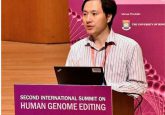UK Parliamentary Office publishes brief on human germline genome editing

The UK Parliamentary Office of Science and Technology (London, UK) has released a new research briefing on human germline genome editing outlining techniques, safety, current and future applications and legislation.
The peer-reviewed briefing is based on literature review and interviews with a number of UK-based experts, and follows on from the storm that arose after He Jiankui claimed to have successfully performed human germline genome editing in China, resulting in the birth of twins.
Covering CRISPR—Cas9, along with the newer techniques of base-editing and prime editing, the report summarizes safety concerns, including off-target effects. It also highlights the need for further research before the techniques can be used for potential applications in the clinic.
UK researchers are using these techniques to help develop treatments for cancer, and clinical trials are underway in the UK to make non-heritable DNA changes, for example to treat leukemia. However, UK law currently prohibits heritable genome editing. Arguments for its prohibition include ethical concerns and the availability of alternative methods to prevent the inheritance of diseases, although these are often not ideal.
In brief, the UK’s Human Fertilisation and Embryology Act 1990 prohibits embryos that have had germline DNA altered from being placed inside a woman. However, in some instances, it allows the Human Fertilisation and Embryology Authority (London, UK) to authorize research involving embryos outside the body.
Laws across the globe are inconsistent – some countries have no specific prohibitions, while some have joined together in a convention agreeing to its prevention.
However, in the wake of He Jiankui, some scientists have called for a global moratorium on human germline genome editing research until an international agreement is established. Initiatives have also been launched such as the ‘global observatory’. Developed by the WHO (Geneva, Switzerland), this began in August 2019 and seeks to form a global research registry. Another initiative, introduced in 2019, is the International Commission on the Clinical Use of Human Germline Genome Editing, launched by the UK’s Royal Society (London, UK) and the US National Academies of Science and Medicine (MD, USA). This commission seeks to develop standards and intends to publish a report later on this year.
The results from initiatives such as these will be especially important given the continued advancements in research are leading to innovations – such as the ability to transplant wombs or edit germline cells internally – that would not be covered by the current UK legislation. As a result, that legislation needs to continue to evolve in tandem with technology.
The new report goes on to summarize ethical considerations, medical rationale, the availability of evidence-based research and what is currently known about public support. We recommend reading the 4-page report in full here.





